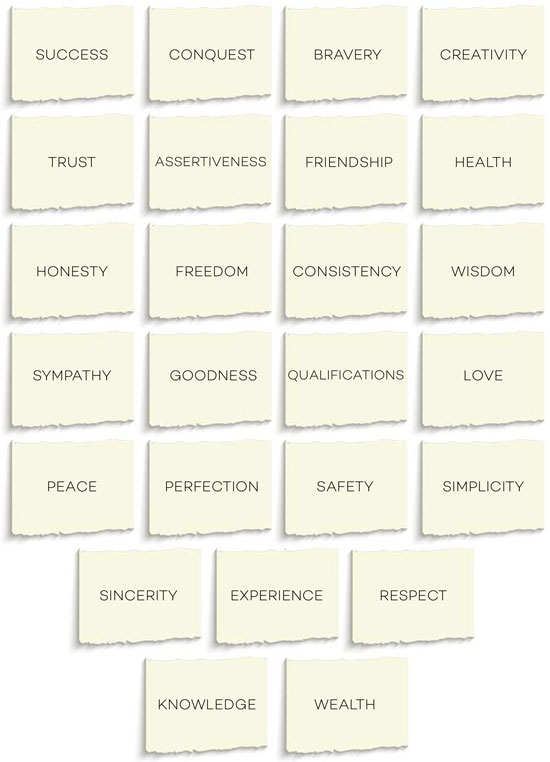Your value scale

Your financial goals, whether ambitious or simple, are ultimately targeted toward what truly matters to you. Whether it is as simple as buying an item in the supermarket or as difficult as choosing a house, it is all about meeting your needs and wants. The right choice for you is one that is based on your values and on the beliefs that are most important and meaningful to you. Let’s say Tuan attaches great importance to helping others and he spends a monthly amount to support orphans. Tuan’s goal is to become a rich so that he can help more children, something he has wanted to do since childhood.
The value scale represents the value and awareness of each individual. It directly affects and determines one’s own ideals, beliefs, life goals, and desires. The characteristics of the value scale are reflected in your priorities from high to low.
From the beginning until now, you've practiced assessing your financial health, financial goals, and consumption in order to live a happy life. Now let’s take a look at whether the goals really meet your values and adjust accordingly.
TO DETERMINE YOUR VALUE SCALE, GIVE AT LEAST 3 ANSWERS TO EACH OF THE FOLLOWING QUESTIONS IN HIGHEST TO LOWEST ORDER.
⇒ WHAT IS IMPORTANT TO YOU IN LIFE?
⇒ IF YOU DIDN'T HAVE TO WORRY ABOUT MONEY OR ANY PROBLEMS, WHAT WOULD YOU SPEND ALL YOUR TIME DOING?
⇒ WHAT ARE YOU MOST PROUD OF ABOUT YOURSELF?
⇒ WHEN DID YOU FEEL THE HAPPIEST?
⇒WHICH TYPES OF STORIES AND PEOPLE TEND TO INSPIRE YOU?
By writing down concise answers to the questions above, you've begun to define your value scale. To help you, here is a list of personal values - you can choose at least 3 words that are most important to you:

You can select more than 3 values, as many as half of the listed values, or add other values to the list above. From the selected values, how do you know which is the most important? You may need more time to reflect on the original questions and re-think what has happened in life that make you truly happy. And when you can answer those questions with emotion instead of reason, you will determine what your value scale is.
Once you have your own scale, you will have a clearer direction. If you put “health” at the top of your list, you will know that establishing a daily exercise schedule and cutting out unhealthy foods are top priorities. On the other hand, if “success” is at the top of the list, you will spend most of your time and effort on goals that lead to success, be they small successes at work to larger ones.
Take some time to rearrange the values in the list above according to your own value scale. Or you can compare each value and ask yourself what you would choose if you had to remove the less important ones. Take your time and be patient until you have a final value scale that you are satisfied with.